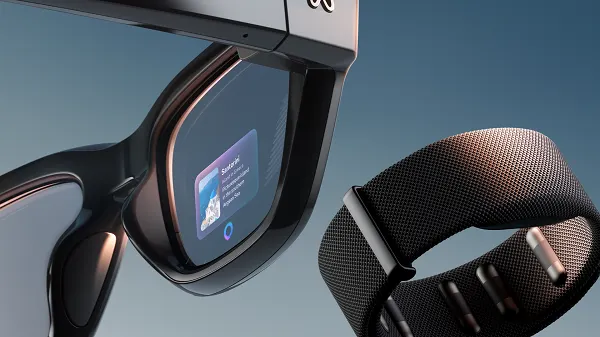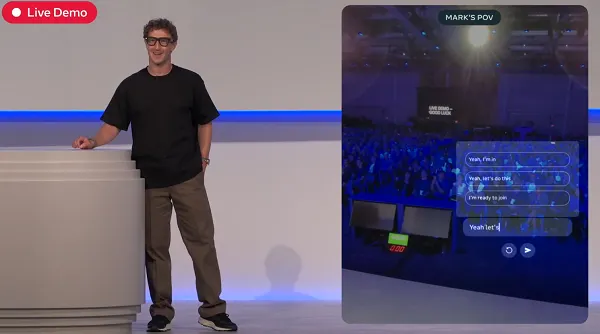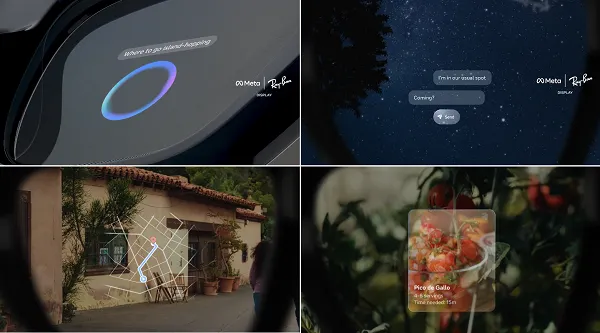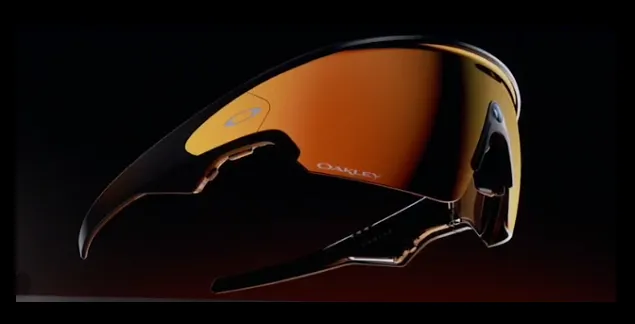Meta Unveils Futuristic AI Glasses and VR Breakthroughs at Connect 2025
 Adshine.pro09/18/20254 views
Adshine.pro09/18/20254 viewsMeta has officially kicked off its two-day Meta Connect conference, where CEO Mark Zuckerberg unveiled a wave of new innovations spanning AI glasses, VR creation, advanced interaction tools, and more.
The centerpiece of Meta Connect 2025 is the debut of the Ray-Ban-branded Meta Display AI glasses, which integrate a heads-up display to overlay digital information directly into the wearer’s line of sight.

As demonstrated on stage, the glasses allow users to interact with a digital interface projected onto a small in-lens screen, controlled through Meta’s long-awaited neural wristband device.
The “Meta Neural Band,” described by Zuckerberg as “the next chapter in the history of computing,” leverages differential electromyography (EMG) to read subtle muscle movements and translate them into digital signals. The concept is to replace traditional inputs—touchscreens, buttons, and dials—with silent, intuitive wrist-based gestures.
According to Meta:
“We’re excited to introduce our Meta Neural Band. It replaces the touchscreens, buttons, and dials of today’s technology with a sensor on your wrist, so you can silently scroll, click, and soon even write messages using subtle finger movements.”

Zuckerberg showed off examples such as messaging and calling with discreet gestures, or writing in mid-air with motions that the band converts into text. While the movements may resemble fidgeting, the overall control method is surprisingly subtle.
The wristband, water-resistant and offering up to 18 hours of battery life, represents a critical building block in Zuckerberg’s long-term vision: AR glasses eventually overtaking smartphones as the main gateway to the online world. Changing ingrained habits won’t happen overnight, but Meta sees this as the beginning of that transition.
The Meta Display AI glasses will retail for $799, launching September 30.
Alongside them, Meta also announced Oakley Meta Vanguard glasses, a model tailored for athletes. Lighter and equipped with a single center-frame camera for better balance, the Vanguard offers a 120-degree field of view, improved video stabilization, and integrations with Garmin and Strava for performance tracking. Priced at $499, pre-orders are open with shipping slated for October.

Updates are also rolling out for Meta’s existing Ray-Ban AI glasses, including 3K video recording, better battery life, enhanced live translation, and a new “Conversation Focus” feature that sharpens friends’ voices in noisy environments.
Meanwhile, Meta’s Live AI assistant is getting smarter, providing contextual assistance based on what the wearer sees.
Zuckerberg emphasized that adoption of its AI glasses is trending in line with some of the most successful consumer devices ever launched, suggesting the company’s wearables strategy is on the right track.

On the VR front, Meta announced Horizon Studio, powered by its new Meta Horizon engine, which will replace Unity as its VR operating system. The platform promises streamlined VR world-building through text prompts, faster load times, and access to an always-on AI assistant. A new “Hyperscape” capture system will even allow users to scan physical rooms with a Quest headset and instantly transform them into immersive 3D environments.

Zuckerberg framed these developments as “foundational infrastructure for the metaverse,” lowering the barriers for VR creation and democratizing immersive design. The company also previewed upcoming VR games and Horizon TV, a next-generation VR video hub.

Despite speculation that Meta had scaled back its metaverse ambitions, Zuckerberg left no doubt that the long-term vision is alive and well. From wristband input to AR glasses and AI-driven VR, the company sees all of these elements converging into its broader push toward an interconnected metaverse.
📢 If you're interested in Facebook Ads Account, don't hesitate to connect with us!
🔹 https://linktr.ee/Adshinepro
💬 We're always ready to assist you!